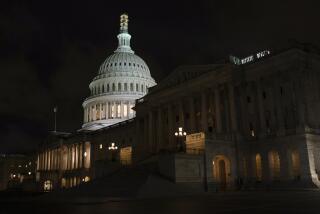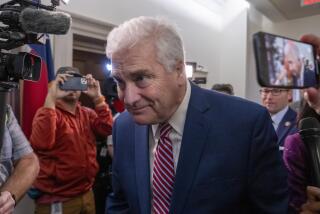White House adjusts strategy on Republicans
- Share via
Reporting from Washington — As voters lose patience with political gridlock, the Obama administration is embarking on a strategy aimed at putting Republicans on the spot: Either participate in bipartisan exchanges initiated by the president, or be portrayed as the party of obstruction.
The new approach is part of a series of adjustments the White House is making as it deals with the aftermath of Republican Scott Brown’s victory in Massachusetts, which cost Democrats their filibuster-proof majority in the Senate.
Right now, it’s not clear voters blame one party more than the other for paralysis in Washington. A recent poll by NBC News and the Wall Street Journal showed that voters are as apt to blame congressional Republicans as Democrats for the standoff. Virtually everyone surveyed agreed there is too much infighting in the capital.
In a flurry of recent public appearances, President Obama has sent a message that he is prepared to embrace GOP ideas. But he is also signaling that if Republicans balk at compromise, he’ll exact a political price.
Republicans, said White House Communications Director Dan Pfeiffer, “have a role to play in solving problems in this country, or be accountable to the electorate for choosing not to.”
Republicans don’t see Obama’s overtures as sincere. They view with particular suspicion Obama’s invitation to hash out differences on healthcare at a televised meeting Thursday. Republicans who boycott the gathering risk looking obstinate. But showing up isn’t a winning strategy either, some Republicans caution. They fear the format is one that guarantees the president will appear the statesman.
“When you’re the president, you have the loudest microphone and clearest TV camera,” said Mark Corallo, a Republican strategist. “You get to stand up and look reasonable, bipartisan and leader-like. And anyone else ends up . . . looking like a petty partisan who is just interested in saying no. There’s no upside for the Republicans in even attending the healthcare summit.”
Obama has been busy on other fronts positioning himself as the seeker of bipartisan solutions to the nation’s problems. Last week he named GOP former Sen. Alan Simpson of Wyoming as co-chairman of a commission that will look for ways to curb the trillion-dollar deficit. He also announced billions of dollars in federal loan guarantees promoting nuclear power, an energy source that many Republicans see as a solution to the country’s electricity needs.
In a recent news conference, Obama said he was open to giving ground in exchange for GOP support for his energy plan, which is foundering in the Senate.
“I’m willing to move off some of the preferences of my party in order to meet them halfway,” the president said. “But there’s got to be some give from their side as well.”
An administration official said that in coming months, the White House would be quicker to point out instances of what he described as Republican intransigence. Though the White House has long believed that Republicans were committed to derailing Obama’s agenda, officials will be more aggressive in making the case.
“The Massachusetts election obliterated the argument that we could [govern] all on our own,” said the administration official, who spoke on condition of anonymity because he was not authorized to speak publicly. “What we’re doing now is actively reaching out and demonstrating our interest in bipartisanship -- but not passively standing by if Republicans are not willing to meet us halfway.”
The White House will be relying on a wider network of people to drive home its message. As part of its retooled communications strategy, more Cabinet secretaries will be in front of the cameras to defend the administration’s record.
The plan is already on display. Cabinet members fanned out across the country on the anniversary of the $787-billion stimulus package being signed into law, touting projects now underway and countering GOP criticism that the bill was a waste of money that did little to curb unemployment.
Last year, by contrast, Obama often carried the administration’s message alone. “There was a reluctance to hand off the ball,” said the White House official.
More to Read
Get the L.A. Times Politics newsletter
Deeply reported insights into legislation, politics and policy from Sacramento, Washington and beyond. In your inbox twice per week.
You may occasionally receive promotional content from the Los Angeles Times.










